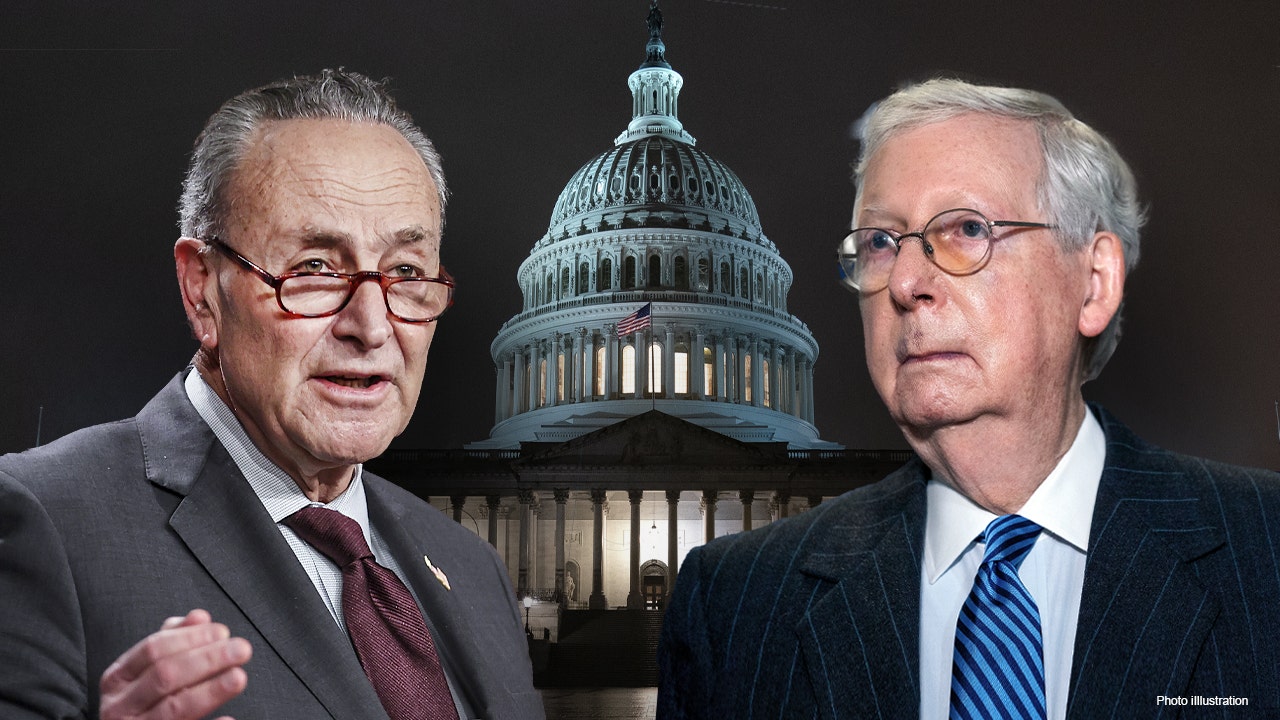
Fox News congressional correspondent Chad Pergram discusses the battle to avoid government shutdown amid vaccine mandates debate.
Senate lawmakers voted Thursday night to approve a bill that funds the government through Feb. 18, avoiding a government shutdown with roughly 24 hours to spare despite a partisan clash regarding President Biden’s federal vaccine mandate.
The Senate voted 69-28 in favor of the continuing resolution, which approves government funding at the prior year’s levels until a new bipartisan agreement is reached. The resolution includes $7 billion in new funding to support Afghan refugees.
The bill now proceeds to Biden’s desk for final approval.

Senate Majority Leader Chuck Schumer, D-N.Y., arrives at the Capitol in Washington, Thursday, Sept. 30, 2021. (AP Photo/J. Scott Applewhite) (Associated Press)
“I am glad that in the end, cooler heads prevailed. The government will stay open,” Senate Majority Leader Chuck Schumer, D-N.Y., said. “And I thank the members of this chamber for walking us back from the brink of an avoidable, needless and costly shutdown.”
Moderate Democratic Sen. Joe Manchin of West Virginia was among the senators who voted in favor of the continuing resolution.
“In the midst of the COVID-19 pandemic and as the new Omicron variant emerges, I will not vote to shut down the government for purely political reasons,” Manchin said in a statement.
A standoff between Senate Democrats and a handful of Republicans over the federal vaccine mandate nearly derailed the vote. Republican Sens. Ted Cruz of Texas, Mike Lee of Utah and Roger Marshall of Kansas demanded a separate vote on an amendment to bar funding for the Occupational Safety and Health Administration, the entity responsible for implementing Biden’s mandate.
Schumer allowed the vote on the amendment to proceed ahead of the vote on the continuing resolution.

Sen. Ted Cruz, R-Texas, speaks at a news conference on Capitol Hill in Washington, Wednesday, Oct. 6, 2021, to speak about immigration at the U.S.- Mexico boarder. (AP Photo/Andrew Harnik) (Associated Press)
Senators voted to reject Marshall’s amendment on the vaccine mandate. The amendment fell short of the 51 votes required to pass. Manchin and fellow moderate Democrat Sen. Kyrsten Sinema of Arizona each voted against the measure.
Republicans widely oppose the mandate, which forces companies with 100 or more employees to ensure their employees are vaccinated against COVID-19 or undergo regular testing. GOP lawmakers argue the mandate is too broad and constitutes federal overreach.
“No precedent exists in American history for punishing private employers who don’t enforcement government vaccination edicts,” Marshall said in a floor speech ahead of the vote on his amendment.
Lee said millions of Americans were “being threatened right now with losing their jobs” due to the mandate. He argued that Democrats, not Republicans, risked the shutdown in their effort to prevent a vote on the amendment.

Senate Minority Leader Mitch McConnell, R-Ky., arrives at the Capitol in Washington, Wednesday, Oct. 6, 2021, as a showdown looms with Democrats over raising the debt limit. (AP Photo/J. Scott Applewhite) (Associated Press)
GET FOX BUSINESS ON THE GO BY CLICKING HERE
“Those in this chamber who shamefully were refusing over and over again to even let us cast a vote on that simple measure threatened to shut down all of government because they didn’t want us to have a chance, as the people’s elected lawmakers, to decide whether or not we should proceed with vaccine mandate enforcement,” Lee said.
The vote on the continuing resolution brought the Senate in sync with House lawmakers, who hours earlier voted 221-212 in favor of the continuing resolution to fund the government through Feb. 18. Rep. Adam Kinzinger, R-Ill., was the lone GOP representative to vote in favor of the resolution.






